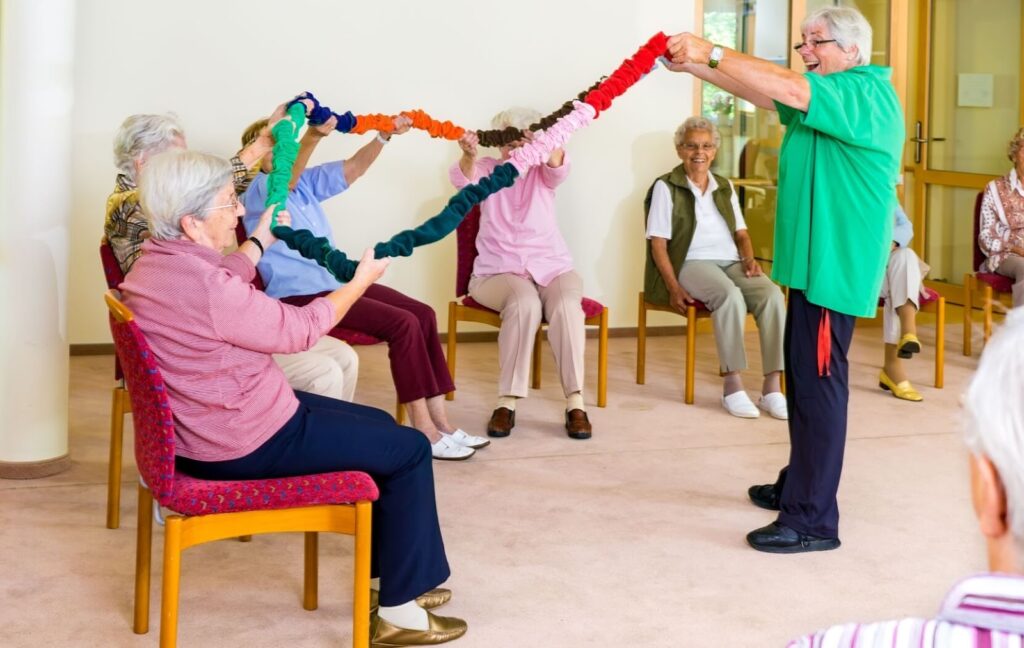Making decisions about the care of a loved one with dementia or Alzheimer’s disease is never easy. One of the most significant transitions families may face is determining when it’s time to move from assisted living to memory care.
Knowing when a change is necessary requires a compassionate, thoughtful approach to help your loved one receive the proper support. Some key signs to look out for include:
- Changes in behavior
- Growing care needs
- Increasing safety concerns
- Social withdrawal or isolation
- More frequent wandering or elopement
What’s the Difference Between Assisted Living & Memory Care?
Assisted living is designed for seniors who need help with everyday tasks like cooking, cleaning, and bathing but remain relatively independent. These communities prioritize convenience, offering services like meal preparation and social activities in a residential atmosphere.
Memory care focuses specifically on the needs of individuals living with cognitive impairment, dementia, or Alzheimer’s. These communities provide a more structured environment and 24/7 care tailored to address challenges like memory loss, confusion, and changes in behavior.
While assisted living supports day-to-day tasks, memory care is essential for those requiring specialized attention and a safe, comforting environment.
Signs It’s Time to Move to Memory Care
There are several signs that it might be time to make the move to memory care. The most common signs it’s time are:
1. Changes in Behavior
Behavioral changes are often one of the first signs that your loved one may need additional care. These changes might include increased confusion, agitation, wandering, or aggression.
Assisted living staff may struggle to manage these behaviors without specialized training, potentially leaving your loved one without the support they need.
Memory care units provide secure environments and highly trained caregivers who understand how to effectively and compassionately manage these behaviors.
2. Growing Care Needs
As memory conditions progress, your loved one may require more hands-on assistance with daily activities. Tasks like dressing, eating, and using the bathroom may become more challenging for them.
Memory care communities are equipped to handle these increasing needs, offering continual support and personalized programming to enhance quality of life.
Activities like cognitive stimulation, creative therapy, and tailored exercise routines are designed to give residents purpose and joy.
3. Safety Concerns
Safety becomes a critical factor as dementia advances. Seniors living with memory impairments may experience diminished physical abilities, increasing their risk of falls or other accidents.
Memory care communities are built with safety in mind, offering features like secure entrances, emergency call systems, and round-the-clock monitoring. These built-in measures help keep residents safe while still promoting their independence.
4. Social Withdrawal or Isolation
While assisted living communities foster social engagement, individuals with dementia or Alzheimer’s may struggle to participate in large-group activities. They might feel overwhelmed or withdraw from the community, leading to feelings of isolation or loneliness.
Memory care offers tailored social opportunities and smaller group sizes, creating comfortable interactions for those with cognitive challenges. Trained staff provide encouragement, helping residents feel included and valued in their community.
5. Wandering or Elopement
Wandering, also known as elopement, is a common behavior among those with dementia and poses a significant safety risk. A person may leave their living area unnoticed, often resulting in dangerous situations.
Memory care communities reduce the risks with secure environments, such as alarms on doors, enclosed outdoor spaces, and vigilant staff. These features allow your loved one to explore their surroundings safely, providing you with peace of mind.
The Benefits of Memory Care

Transitioning to memory care offers many benefits designed to support individuals with memory impairments and enhance their overall well-being. Some services to look out for when choosing a memory care community include:
- Personalized support
- Each resident receives a care plan tailored to their unique needs, helping them thrive in their new community.
- Structured daily routines
- Consistent schedules help reduce confusion & agitation, creating a calm & comforting atmosphere
- Engaging activities
- From music therapy to puzzles, memory care communities offer opportunities for cognitive stimulation that help maintain mental sharpness & encourage connections
- Nutritious meals
- Chef-prepared meals cater to each resident’s dietary needs, providing nourishment & enjoyment
- Specialized care
- Residents benefit from 24/7 supervision by trained caregivers who understand the complexities of dementia & Alzheimer’s disease
Compassionate & Customized Memory Care
Choosing memory care is never an easy decision—but it’s made out of love and concern for your family member’s well-being. At Bluegrass Way Senior Living, we provide a secure, supportive, and welcoming environment for seniors experiencing cognitive decline.
If you’re noticing signs that your loved one may need more specialized support, we’re here to guide you. Contact us today to schedule a tour to see if our community is right for your loved one with dementia.



